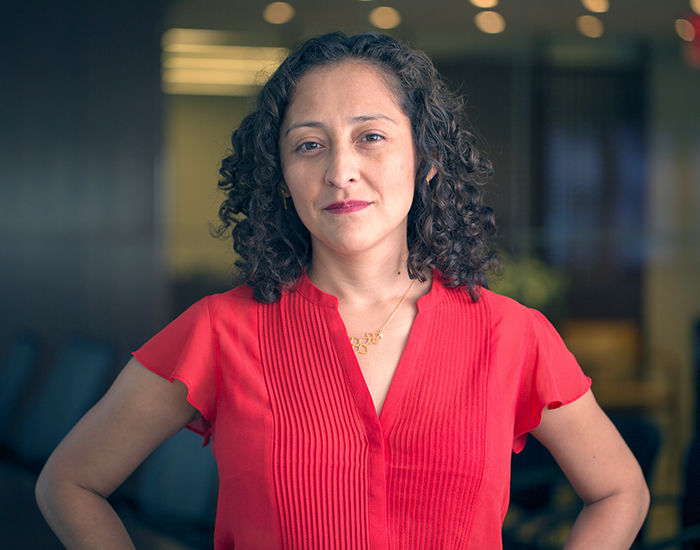Keck Graduate Institute alumna Dr. Sindy Escobar Alvarez, Program Director for Medical Research at the Doris Duke Charitable Foundation, recently published Strategies for Inclusive Grantmaking in Nature Medicine. The publication proposes potential methods that grantmaking organizations can use to increase the diversity of the biomedical research workforce, which can accelerate scientific discovery and decrease health disparities.
The article resulted from a collaboration between member organizations affiliated with the Health Research Alliance (HRA), a coalition of nonprofit funders of biomedical research. Escobar Alvarez serves as board chair for the HRA.
“The biomedical research funding community is aware not only of the lack of diversity in the workforce but also of issues regarding who applies for support and who gets funded,” Escobar Alvarez, MBS ’02, said. “To varying degrees, biomedical research funders have documented whether their processes equally support all of those who apply. So this was an attempt to determine which organizations are trying which strategies and what we can learn from each other.”
Thus, the paper reflects the efforts of these research funding organizations to share their practices with others in an organized way. Furthermore, the procedures outlined in the paper can serve as a guide for organizations who want to improve in inclusive grantmaking but are unsure where to start.
One strategy the publication explores is demographic data collection. Collecting data on categories including gender, race, ethnicity, sexual orientation, socioeconomic status, and disability status allows funders to evaluate diversity within their programs and track the effectiveness of any strategies implemented to increase equity and inclusion across the grants cycle.
The second main strategy covered is deliberately diversifying the pool of research applicants and grantees.
“Although we as science funders aim our proposal requests for wide distribution, they may only go to the same circles,” Escobar Alvarez said.
Thus, HRA member organizations have broadened the distribution of funding announcements to include direct outreach to affinity-based societies, institutions, and applicants from under-represented groups. Social media and informational webinars can also be effective for broader distribution.
Finally, organizations are investigating the best strategies to reduce bias in peer review. This can be accomplished through anti-bias training, which can be carried out by diversity professionals or the research institutions themselves.
Other strategies include blinded peer review and rubrics to help reviewers determine appropriate criteria for evaluating applications, thus potentially reducing scoring bias.
“In the paper, we also address the misconception that diversity comes at the expense of excellence in research,” Escobar Alvarez said. “It’s so ingrained in the culture of medicine and science to have a narrow definition of excellence—not only in terms of appearance but also in terms of skills and other attributes that people traditionally associate with science. In this way, we exclude people who could be contributing.”
Another potential strategy to accommodate research applicants from diverse and non-traditional backgrounds—particularly those who have experienced economic hardship—is to provide an opportunity for applicants to discuss any details about their career trajectory or life experiences that they feel are important for the reviewers to know.
“I do want to emphasize that as funders, we need to be open to experimenting with different strategies and documenting whether or not they are effective,” Escobar Alvarez said. “So some of these methods may not be the perfect solution, but if that turns out to be the case, we can change course accordingly.”
Experimentation has been a running theme in Escobar Alvarez’s life, particularly as a member of KGI’s first graduating class in 2002.
“Everyone in my class was a pioneer,” Escobar Alvarez said. “There was also much openness from the faculty and the administrative leadership when determining what was working for the students.”
Another attribute that Escobar Alvarez and her cohorts in KGI’s Master of Business and Science program shared is that they all came from a science background but also had a desire to better understand the practical application of scientific concepts in industry.
“I appreciate how KGI showed me the bigger picture,” Escobar Alvarez said. “Even though I went on to get a PhD in Pharmacology, I feel like my KGI experience influenced my choice to work in philanthropy where I could have a broader impact and still apply this lens as a scientist to improving the workforce and to facilitating their discoveries.”
One professor who particularly stood out—and who is still at KGI today—was Dr. James Sterling.
“We only had 29 students, so we got to know the students quite well, and I remember Sindy fondly,” Sterling said. “It’s gratifying to see her in a leadership role at the Doris Duke Foundation and her contributions with the Health Research Alliance as they strive to ensure that all applicants for healthcare funding have fair review devoid of bias.”
When it comes to reaching this goal, Escobar Alvarez wants individual funders to understand that there are actions they can take.
“You don’t need to wait for the whole organization to enact change,” Escobar Alvarez said. “If you’re a Grants Manager, you could try to collect better data on applicant demographics. If you’re running review panels, you could be more mindful of selecting reviewers representing the diversity of the population, your specific disease area, and the patients you’re seeking to serve.”
Individuals working towards the same goal can then compile their data and share their results to better gauge on a large scale which strategies are most effective, as Escobar Alvarez and her collaborators have done in their publication. Any improvements that funders make will, in turn, positively affect the field of medical research.
“The Health Research Alliance has around 100 members, who together have supported billions of dollars in research, and thousands of researchers,” Escobar Alvarez said. “Thus, any changes in whom we support can have a huge impact on research and the people who do the research.”
